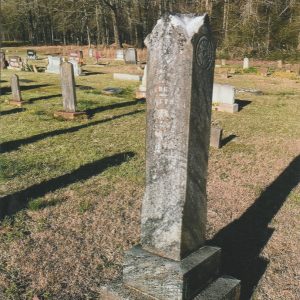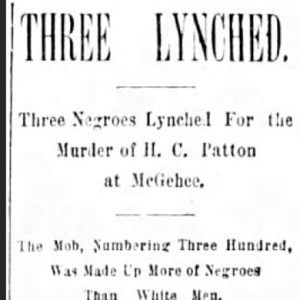calsfoundation@cals.org
McGehee Lynching of 1894
On September 22, 1894, Luke Washington, Richard Washington, and Henry C. Robinson were lynched in McGehee (Desha County) for allegedly murdering local merchant H. C. Patton and robbing his store. One of the interesting aspects of this case is that the African-American population of McGehee (then known as McGehee Junction) reportedly took an active part in the three men’s lynching.
On September 20, 1894, Patton locked his store, which was located on the edge of a cotton field some distance from the depot in McGehee, and proceeded along the walkway to his bedroom. There, Robinson and the two Washingtons allegedly killed him with a club. Although Patton was armed with a pistol, he was unable to use it in time. His attackers then dragged him behind the store, where they cut his throat. They stole the small amount of money he had on hand and as much merchandise as they could easily carry away. According to the Arkansas Gazette, the following day, Sheriff H. S. Henry formed a “quite orderly, determined posse” to pursue the unknown perpetrators. Tempers were running high, and it was assumed that the perpetrators would be lynched, giving the “English committee…a new case ‘for investigation.’” (This comment was in reference to an actual British committee that was touring the South at the time, investigating lynchings.) Luke Washington, Richard Washington, and Henry C. Robinson were arrested that night in Pine Bluff (Jefferson County), allegedly recognized because they were spending money with blood on it. They were brought back to McGehee and appeared before a coroner’s inquest, where they all confessed.
During this period, Black residents outnumbered whites five-to-one in Desha County. According to the Austin Weekly Statesman, local Black citizens “took a leading part in the proceedings and passed word around among the white people to await patiently the result of the coroner’s inquest, promising that as soon as all doubt of the prisoners’ guilt had been removed, the colored people would take the case in their own hands and satisfy the public demand for revenge.” Indeed, the Gazette report stated that Dr. John I. Hancock, Patton’s stepbrother, had visited McGehee and “was thoroughly convinced that the negro population of the town would take the law in their own hands as soon as the guilty parties could be discovered.” Following the inquest, the sheriff prepared to take the prisoners to the county jail in Arkansas City (Desha County). Around 7:30 p.m., a mob of both white and Black citizens (some sources estimate that there were only about fifty whites in the crowd) overpowered the sheriff and hanged the accused from telephone poles near the crime scene. According to the Weekly Statesman, “hundreds of guns were then leveled at the writhing forms, and the murder of H. C. Patton was avenged.”
Governor William Meade Fishback, who was attempting to clean up Arkansas’s image, was outraged. He was quoted as saying: “There is no possible excuse for lynching these men, for if guilty there is no doubt of their conviction and execution by legal process.” He offered a $200 reward each for the arrest and conviction of the leaders of the mob.
Writers for the Richmond Planet applauded this move as “a step in the right direction.” Recognizing that the perpetrators of the lynching were unlikely to be arrested, and even less likely to be convicted, they opined that “such actions will finally result in the elimination of the evil. These murderous cut-throats should be taught a lesson and the people, living in the neighborhood, should be the ones to do it. Colored men of the south should purchase insurance policies to protect their houses, and revolvers and Winchesters to protect their lives. Lynch-law must go!” This was not to be the case, however. During the next forty-two years, there were two more recorded lynchings in Desha County, those of Charles Malpass (white) in 1911 and Leroy Smith (Black) in 1921. During the same period, 157 people were reported lynched in the state of Arkansas.
For additional information:
“An Arkansaw Lynching.” Austin Weekly Statesman (Austin, Texas), September 27, 1894, p. 5.
“Foully Murdered.” Arkansas Gazette, September 22, 1894, p. 1.
“Three Lynched.” Arkansas Gazette, September 23, 1894, pp. 1, 6.
Untitled article. Richmond Planet (Richmond, Virginia), October 13, 1894, p. 2.
Nancy Snell Griffith
Clinton, South Carolina


 Clay Patton Grave
Clay Patton Grave  McGehee Lynching Article
McGehee Lynching Article 



Comments
No comments on this entry yet.